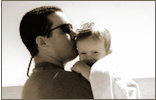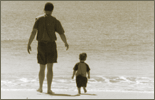May 31, 2004
Remember
Yesterday our pastor asked all the men who served during the second world war to stand. Five men stood out of a congregation of about two hundred. Had you seen them in any other context, they would have appeared slight, thin, bent over by the weight of years. But in that moment they were giants, and are, and we too easily overlook their sacrifice.
Next the pastor asked everyone who has served or currently serves in the U.S. military to stand. The old men were joined by several others, and for a moment the rest of us were humbled as we looked upon men who willingly risked their very lives for love of country.
Memorial Day is as much for the dead as for the living, and these have no seats in our church. It is troublesome to think about death on a day when the grill awaits, when there are friends to see, when hours of leisure stretch out before us. But think for just a moment on those who have died because they love this country which, for all its flaws, has served as a bastion of liberty, and has offered its blood more than once so that others might share this liberty as well.
Civil War
"Fourscore and seven years ago our fathers brought forth on this continent a new nation, conceived in liberty and dedicated to the proposition that all men are created equal.
Now we are engaged in a great civil war, testing whether that nation or any nation so conceived and so dedicated can long endure. We are met on a great battlefield of that war. We have come to dedicate a portion of it as a final resting place for those who died here that the nation might live. This we may, in all propriety do. But in a larger sense, we cannot dedicate, we cannot consecrate, we cannot hallow this ground. The brave men, living and dead who struggled here have hallowed it far above our poor power to add or detract. The world will little note nor long remember what we say here, but it can never forget what they did here.
It is rather for us the living, we here be dedicated to the great task remaining before us--that from these honored dead we take increased devotion to that cause for which they here gave the last full measure of devotion--that we here highly resolve that these dead shall not have died in vain, that this nation shall have a new birth of freedom, and that government of the people, by the people, for the people shall not perish from the earth."
-- Abraham Lincoln, Nov. 19, 1863
"Much of Tuesday, with rain still murmurous on the canvas overhead, Lee spent working on his last report. He finished and signed it next morning, April 12, while his veterans, in Longstreet's words, 'marched to the field in front of Appomattox Courthouse, and by divisions and parts of divisions deployed into line, stacked their arms, folded their colors, and walked empty-handed to find their distant, blighted homes.' The weather having faired, they made as brave a show as their rags and sadness would permit; 'worn, bright-eyed men,' a Federal brigadier would call them. They seemed to him 'purged of the mortal, as if knowing pain or joy no more,' and he asked himself as he watched them pass before him 'in proud humiliation . . . thin, worn, and famished, but erect, and with eyes looking level into ours . . . Was not such manhood to be welcomed back into a Union so tested and assured?'"
-- Shelby Foote, The Civil War
World War I
"The French instructors had much to learn about American psychology. They soon discovered that their new wards were virtually unfettered by tradition, new at war, yet very adaptable. The French instructors, who by this time had become set in their ways of conducting the war, found the Americans puzzling. Writing about the Americans, a French memorandum said,
American units arriving in France have only had, up to the present time, very incomplete instructions . . . gymnastic exercises, close order drill, rifle fire in small warfare, having but little relation to actual warfare . . . The officers are usually strong, athletic, intelligent, and very ambitious to learn. Lacking a solid military foundation, personal temperament dominates . . . In relations with all officers, it should be borne in mind that they have an extremely well-developed sense of amour-propre, based on their pride in belonging to one of the greatest nations in the world. Consequently, an attitude of superiority over them should be assiduously avoided, a fact which in no way prevents absolute subordination required by the service.
A copy of that memo fell into American hands. One commentator wrote,
The offensive spirit of the French and British Armies has largely disappeared as a result of their severe losses. Close association with beaten forces lowers the morale of the best troops . . . In many respects, the tactics and technique of our Allies are not suited to American characteristics or the American mission in this war . . . Berlin can not be taken by the French or the British Armies or by both of them. It can only be taken by a thoroughly trained, entirely homogenous American Army. An American Army can not be made by Frenchmen or by Englishmen.
To that anonymous note, [General] Pershing appended one of his own: 'That is entirely my own view.'"
-- John S.D. Eisenhower, Yanks
World War II
"Forty-eight members of Easy Company had given their lives for their country. More than 100 had been wounded, many of them severely, some twice, a few three times, one four times. Most had suffered stress, often severe. All had given what they regarded as the best years of their lives to the war. They were trained killers, accustomed to carnage and quick, violent reactions. Few of them had any college education before the war; the only skill most of them possessed was that of combat infantryman.
They came out determined to make up for the lost time. They rushed to college, using the G.I. Bill of Rights, universally praised by the veterans as the best piece of legislation the United States Government ever conceived. They got married and had kids as quickly as possible. They they set out to build a life for themselves . . .
They had a character like a rock, these members of the generation born between 1910 and 1928. They were the children of the Depression, fighters in the greatest war in history, builders of and participants in the postwar boom. They accepted a hand-up in the G.I. Bill, but they never took a handout. They made their own way. A few of them became rich, a few became powerful, almost all of them built their houses and did their jobs and raised their families and lived good lives, taking full advantage of the freedom they had helped to preserve . . .
In one of his last newsletters, Mike Ranney wrote:
In thinking back on the days of Easy Company, I'm treasuring my remark to a grandson who asked, "Grandpa, were you a hero in the war?"
"No," I answered, "but I served in a company of heroes."
-- Stephen Ambrose, Band of Brothers
Korea
"Chosin"
How deep the cold takes us down
into the searing frost of Hell;
where mountain snows,
unyielding winds, strip our flesh,
bare our bones.
The trembling of uncertain hearts,
scream out to echoes not impressed,
as swirling mists of laughing death,
reach out their fingers to compress.
How white the withered skin exposed,
turns into black and brittle flesh
and limbs cast out from conscious thought
still stagger on the arctic frost.
Inmobile does the breath extend
as crystal on the mountain wind,
and eyes now fixed in layers of ice,
see nothing through the dawning light.
This road that leads down to the sea,
twists and turns at every bend
and Chosin's ice that molds like steel,
rains the fire that seeks our end.
The trucks cry out a dirge refrain,
their brittle gears roll on in pain,
upon their beds, the silent dead,
in grateful and serene repose.
Still the mind resists the call,
to lie and die in final pose,
as blood in stillness warms the soul,
and renders nil the will to rise.
The battle carries through the night,
give witness to the dead betrayed,
when frozen weapons fail to fire,
their metal stressed by winter's might.
Still we fight to reach Hungnam,
in solemn oath and brotherhood,
as every able-bodied man
will bring our dead and wounded home.
Uphold traditions earned in blood,
break through the hordes that press us in,
depress their numbers to the place,
where waves of dead deny their quest.
And on to the sea....
-- John Kent, E/2/1 1st Marine Division
Vietnam
"Another war story, you say? Not exactly, for on the more important levels this is a love story, told in our own words and by our own actions. We were the children of the 1950's and we went where we were sent because we loved our country. We were draftees, most of us, but we were proud of the opportunity to serve that country just as our fathers had served in World War II and our older brothers in Korea... We went to war because our country asked us to go, because our new President, Lyndon B. Johnson, ordered us to go, but more importantly because we saw it as our duty to go. That is one kind of love.
Another and far more transcendent love came to us unbidden on the battlefields as it does on every battlefield in every war man has ever fought. We discovered in that depressing, hellish place where death was our constant companion that we loved each other. We killed for each other, we died for each other and we wept for each other. And in time we came to love each other as brothers. In battle our world shrank to the man on our left and the man on our right and the enemy all around. We held each other's lives in our hands and we learned to share our fears, our hopes, our dreams as readily as we shared what little else good came our way.
We were the children of the 1950's and John F. Kennedy's young stalwarts of the early 1960's. He told the world that Americans would go anywhere, pay any price, bear any burden in the defense of freedom. We were the down payment on that costly contract, but the man who signed it was not there when we fulfilled his promise. John F. Kennedy waited for us on a hill in Arlington National Cemetery, and in time, by the thousands, we came to fill those slopes with our white marble markers and to ask on the murmur of the wind if that was truly the future he had envisioned for us...
Many of our countrymen came to hate the war we fought. Those who hated it the most---the professionally sensitive---were not, in the end, sensitive enough to differentiate between the war and the soldiers who had been ordered to fight it. They hated us as well, and we went to ground in the crossfire, as we had learned in the jungles.
In time our battles were forgotten, our sacrifices discounted and both our sanity and our suitability for life in polite progressive American society were publicly questioned. Our young-old faces, chiseled and gaunt from the fever and the heat and the sleepless nights, now stare back at us, lost and damned strangers, frozen in yellowing snapshots packed away in cardboard boxes with our medals and ribbons.
We rebuilt our lives, found jobs or professions, married, raised families and waited patiently for America to come to its senses. As the years passed we searched each other out and found that the half-remembered pride of service was shared by those who had shared everything else with us. With them, and only with them, could we talk about what had really happened over there---what we had seen, what we had done, what we had survived.
We knew what Vietnam had been like, and how we looked and acted and talked and smelled. No one in America did. Hollywood got it wrong every damned time, whetting twisted political knives on the bones of our dead brothers.
So once, just this once, this is how it all began, what it was really like, what it meant to us and what we meant to each other. It was no movie. When it was over the dead did not get up and dust themselves off and walk away. The wounded did not wash away the red and go on with life unhurt. Those who were, miraculously, unscratched were by no means untouched. Not one of us left Vietnam the same young man he was when he arrived."
-- Harold Moore and Joseph Galloway, We Were Soldiers Once... And Young
Posted by Woodlief on May 31, 2004 at 07:57 AM


Thanks for posting those pieces, Tony. reminds me again of the sacrifices made by ordinary men, who did noy shy away from doing their duty, and who made the world a better place for us to live in. And in today's day and age, we sure do need reminding - because, if I am to believe in the domnant paradigm in Ann Arbor, all Americam soldiers are, are a bunch of racist, imperialist hoodlums, out to attack innocent, people of color, and out to oppress them!!!
Posted by: sid at May 31, 2004 10:46 AM

Tony:
Thanks for this compendium. I plan to keep it for future Memorial Days as well.
Even as a former Marine reservist, but one who did not serve in any conflict, when the pastor makes the call for veterens to stand, I avoid doing so because I feel inadeuate to stand with the World War II heroes of our congregation. The amazing thing is that most of these men do not feel they have done anything special.
Sid: forget everything you learn or see in Ann Arbor and you will be just fine.
Posted by: pds at June 1, 2004 9:48 AM

PDS - thanks for your comment.
And Tony and PDS - on Memorial Day, I went an placed some flowers on the grave of PFC Tom Roddy, who is buried in the cemetary near my house. he was the first American soldier killed in the Battle of the Ia Drang Valley - which Gen Hal Moore and Joe Galloway write about, so eloquently in their book.
(BTW, Tony, since you have spent time in A2, the grave I visited in located in the cemetary that is located right next to the U-M Arb on Geddes Ave, a couple of blocks up from the CCRB)
Posted by: sid at June 1, 2004 8:38 PM

|






















